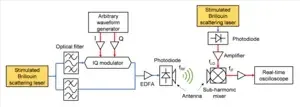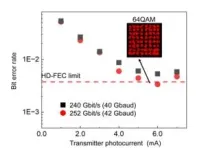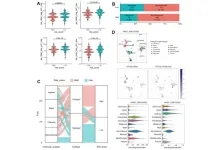(Press-News.org) Pacific Island governments are increasingly imposing taxes on unhealthy foods as they battle a non-communicable disease crisis, a New Zealand study shows.
The research, led by the University of Otago, Wellington, found that since 2000, a quarter of the 22 Pacific Island countries and territories studied had introduced taxes targeting unhealthy foods, a strategy in line with recommendations from the World Health Organization.
The study of food taxation policies over the 20 years to 2020 is published in the international journal Public Health Nutrition.
Senior Research Fellow, Dr Andrea Teng, from the University’s Department of Public Health, says five of the countries in the study introduced new excise taxes during the period, while 14 made changes to tariffs on imported foods. Processed foods, sugar, fatty meats and salt were the main targets of the taxes. Sugar-sweetened drink taxes were not included in the research, but have also been widely implemented in small island states.
Dr Teng says there were a total of 279 taxes identified by food group, of which 15 per cent were excise taxes targeting unhealthy foods, and 85 per cent were import tariffs.
“Some excise taxes are significant, ranging from up to eight per cent in Samoa to 22 per cent in New Caledonia and up to TOP 5/kg in Tonga (US$2.10), CFP 120/kg in French Polynesia (US$1.10) and VT 20/kg in Vanuatu (US$0.17). French Polynesia, for example, has applied a tax to foods such as biscuits, ice cream, jams and chocolate based on their sugar content.
“Taxes like these are an important tool in addressing the food environment and the rising trend of non-communicable diseases.”
Six of the countries, Fiji, French Polynesia, New Caledonia, Samoa, Tonga and Vanuatu applied both excise taxes and import tariffs to food products. The Cook Islands, the Federated States of Micronesia, the Marshall Islands, Nauru, Niue, Papua New Guinea, the Solomon Islands, and Wallis and Futuna used only import tariffs, while American Samoa, the Northern Mariana Islands, Guam, Kiribati, Palau, the Pitcairn Islands, Tokelau and Tuvalu had no identified food tax policies.
Dr Teng says governments in the region are increasingly recognising that dietary policies are a crucial way of addressing high levels of chronic diseases.
“These measures promote healthier food choices, and can improve people’s health.”
But, she says, food taxes need to be applied to unhealthy ingredients in a systematic way to make sure they are as effective as possible.
“Ensuring taxes are based on the level of sugar, fat and salt in foods is a really effective way of encouraging producers to reduce the amount of unhealthy ingredients in products, without placing a high tax burden on consumers.”
END
Pacific nations tax unhealthy foods to tackle NCD crisis
2024-02-01
ELSE PRESS RELEASES FROM THIS DATE:
Climate change threatens older elephants most, jeopardizing African elephants’ future
2024-01-31
January 31, 2024
Climate Change Threatens Older Elephants Most, Jeopardizing African Elephants’ Future
New study from UMass Amherst and Wildlife Conservation Society finds that continuing international cooperation, community involvement most important in ensuring elephants’ survival
AMHERST, Mass. – A collaborative team of researchers from the University of Massachusetts Amherst and the Wildlife Conservation Society (WCS), which runs the world’s largest field conservation program, has conducted first-of-its kind research into how global climate change affects African elephants. The work, published recently in PLOS Sustainability and Transformation, ...
Prognostic significance of senescence-related tumor microenvironment genes in head and neck squamous cell carcinoma
2024-01-31
“These findings provided evidence for the role of senescence in the tumor microenvironment [...]”
BUFFALO, NY- January 31, 2024 – A new research paper was published on the cover of Aging (listed by MEDLINE/PubMed as "Aging (Albany NY)" and "Aging-US" by Web of Science) Volume 16, Issue 2, entitled, “Prognostic significance of senescence-related tumor microenvironment genes in head and neck squamous cell carcinoma.”
The impact of the senescence related microenvironment on cancer prognosis and therapeutic response remains poorly understood. In this new study, researchers Young Chan Lee, Yonghyun Nam, Minjeong Kim, ...
UTIA trade expert elected president of SAEA
2024-01-31
Andrew Muhammad, professor and Blasingame Chair of Excellence in Agricultural Policy at the University of Tennessee Institute of Agriculture, has been elected president of the Southern Agricultural Economics Association. The newly elected president will be recognized at the Association’s upcoming annual meeting in Atlanta, Georgia, from February 3-6.
“We are excited for Dr. Muhammad in this important leadership role,” says Bill Johnson, interim department head for UT’s Department of Agricultural and Resource Economics. “His previous experience with SAEA and his global perspective on agriculture ...
Diabetes medication class tied to lower risk of kidney stones
2024-01-31
Rates of kidney stones are on the rise in the United States and around the world. Type 2 diabetes is associated with increased risk of kidney stones, but some forms of treatment for this condition may also have the benefit of lowering risk of kidney stones. In a study led by investigators from Mass General Brigham, researchers found that there was an association between the use of sodium-glucose contratransporter 2 (SGLT2) inhibitors and a lower risk of developing kidney stones. Their findings are reported in JAMA Internal Medicine.
Researchers from Brigham and Women’s Hospital and Massachusetts ...
Engineers develop hack to make automotive radar hallucinate
2024-01-31
DURHAM, N.C. – A black sedan cruises silently down a quiet suburban road, driver humming Christmas carols quietly while the car’s autopilot handles the driving. Suddenly, red flashing lights and audible warnings blare to life, snapping the driver from their peaceful reprieve. They look at the dashboard screen and see the outline of a car speeding toward them for a head-on collision, yet the headlights reveal nothing ahead through the windshield.
Despite the incongruity, the car’s autopilot grabs control and swerves into a ditch. Exasperated, the driver looks around the vicinity, ...
Strong European backing for Ukraine leaves “little space” for exploitation of pro-Russian politics, study shows
2024-01-31
Strong support for Ukraine means there is “little space” for European politicians to exploit pro-Russia foreign policy messages, a new study shows.
Researchers have found widespread backing for Ukraine across the continent, and for policies that help the nation, such as imposing sanctions on Russia.
But public opinion is more mixed on the approach NATO should take and whether Ukraine should become a member.
Experts found European nations can be classified into three distinct groups. Citizens ...
Did dementia exist in ancient Greek and Rome?
2024-01-31
You might think age-related dementia has been with us all along, stretching back to the ancient world.
But a new analysis of classical Greek and Roman medical texts suggests that severe memory loss — occurring at epidemic levels today — was extremely rare 2,000 to 2,500 years ago, in the time of Aristotle, Galen and Pliny the Elder.
The USC-led research, published in the Journal of Alzheimer’s Disease, bolsters the idea that Alzheimer’s disease and related dementias are diseases of modern environments and lifestyles, with sedentary behavior and exposure to air pollution largely to blame.
“The ancient Greeks had very, very few — but we found them ...
Surgeons’ choice of skin disinfectant impacts infection risk, Canadian-American study shows
2024-01-31
Does the type of solution used by surgeons to disinfect skin before surgery impact the risk of surgical site infection? According to new research from an international trial jointly led by McMaster University and the University of Maryland School of Medicine – yes, it does.
Researchers of the PREPARE trial, which enrolled nearly 8,500 participants at 25 hospitals in Canada and the United States, found the use of iodine povacrylex in alcohol to disinfect a patient’s skin could prevent surgical site infection in thousands of patients undergoing surgery for a closed ...
Trees struggle to ‘breathe’ as climate warms, researchers find
2024-01-31
UNIVERSITY PARK, Pa. — Trees are struggling to sequester heat-trapping carbon dioxide (CO2) in warmer, drier climates, meaning that they may no longer serve as a solution for offsetting humanity’s carbon footprint as the planet continues to warm, according to a new study led by Penn State researchers.
“We found that trees in warmer, drier climates are essentially coughing instead of breathing,” said Max Lloyd assistant research professor of geosciences at Penn State and lead author on the study recently published in Proceedings of the National Academy of Sciences. “They are sending CO2 right back into the ...
New study has promising results for anti-aging effects from enzymatically modified isoquercitrin
2024-01-31
From the study:
This research examines the anti-aging potential of the flavonoid derivative of isoquercitrin known as enzymatically modified isoquercitrin (EMIQ).
A 28-day clinical trial with 30 volunteers aged 31–55 years highlighted EMIQ's effectiveness. Participants using EMIQ-containing Essence displayed reduced facial trans-epidermal water loss and skin roughness, alongside improved skin elasticity. This study emphasizes EMIQ's potential as an anti-photoaging ingredient in cosmetics, warranting further research. The findings pave the way for developing innovative skincare products addressing photoaging effects. ...







